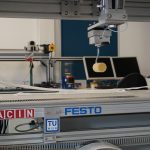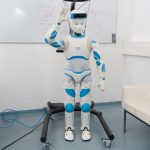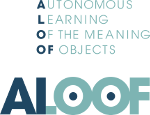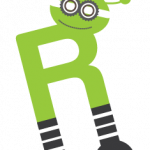
Thermal model and optimal time scheduling of hot rolling
In a heavy-plate rolling mill, hot slabs are rolled out. The plate temperature depends significantly on the process times and it directly influences the product quality. Mathematical models are used for better prediction and control of the product temperature. These models are also useful for an optimization of the processing times. Read more →

Optimization of process times and product sequences in a hot-rolling mill with batch-type reheating furnaces
In semiconductor manufacturing, sputtering processes require targets made of pure metals or alloys. The hot-rolling plant considered in this project produces such target of sintered refractory metal slabs. The goals of this project are to minimize the reheating times and to optimize the product sequence and the processing times for maximum product throughput. Read more →

Automated Handling of Highly Deformable Materials
In this project, a prototype of a handling system is set up and the potential of modern model-based control to handle limp materials is examined. The concepts are applicable to many other issues, such as the automated lamination of large vinyl sheets, textile handling, etc. Read more →

RALLI2016 - 2019
Future social robots will need the ability to acquire new tasks and behaviors on the job both through observation and through natural language instruction, for robot designers cannot build in all environmental and task contingencies in typical application domains such as health care settings or people’s homes. In this project, we tackle the critical subproblem of learning new actions and their corresponding words by the artificial system observing how those actions are performed and expressed by humans. Read more →
ACROSSING2016 - 2019
ACROSSING is an innovative research training network funded by the EU H2020 Marie Sklodowska-Curie Actions programme which aims to change the way millions of the older people in Europe live and maintain wellbeing. The project aims to make a critical contribution towards an open smart home technology infrastructure by interlinking disciplines from sensing technologies, context inferences and interaction and considering key principles of social impact, ethics, security and privacy. Read more →
RoboFit2016 - 2019
Over the course of the project RoboFit, classes from all ages visit the institute to listen to a lecture about robotics, to try out robot navigation during a brief workshop, and to see a demo of our robots Romeo or Pepper. Read more →
AssistMe2015 - 2017
AssistMe develops and evaluates during a user-centered multistage process innovative means of interaction for programming and usage of a robot-based assistive system. Central topic is the integration of users in the concept development where the interaction paradigms are defined as well as in the evaluation stage of the developed technology. Read more →

ALOOF2015 - 2017
ALOOF will enable robots to tap into the ever-growing amount of knowledge available on the Web, by learning from there about the meaning of previously unseen objects, expressed in a form that makes them applicable when acting in situated environments. By searching the Web, robots will be able to learn about new objects, their specific properties, where they might be stored and so forth. Read more →

ER4STEM2015 - 2018
Many children lose their natural curiosity for how things function and interrelate to each other along the way into their lives as young adults. The Educational Robotics for STEM (ER4STEM) project aims to turn curious young children into young adults passionate about science and technology with a hands-on use case: robotics. Read more →

FLOBOT2015 - 2017
Supermarkets, as well as other industrial, commercial, civil and service premises have to be cleaned daily and during the day. FLOBOT addresses these demands by integrating existing research results into a professional floor washing robot platform for wide area industrial, civil and commercial premises. Read more →